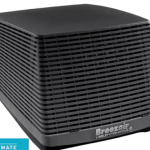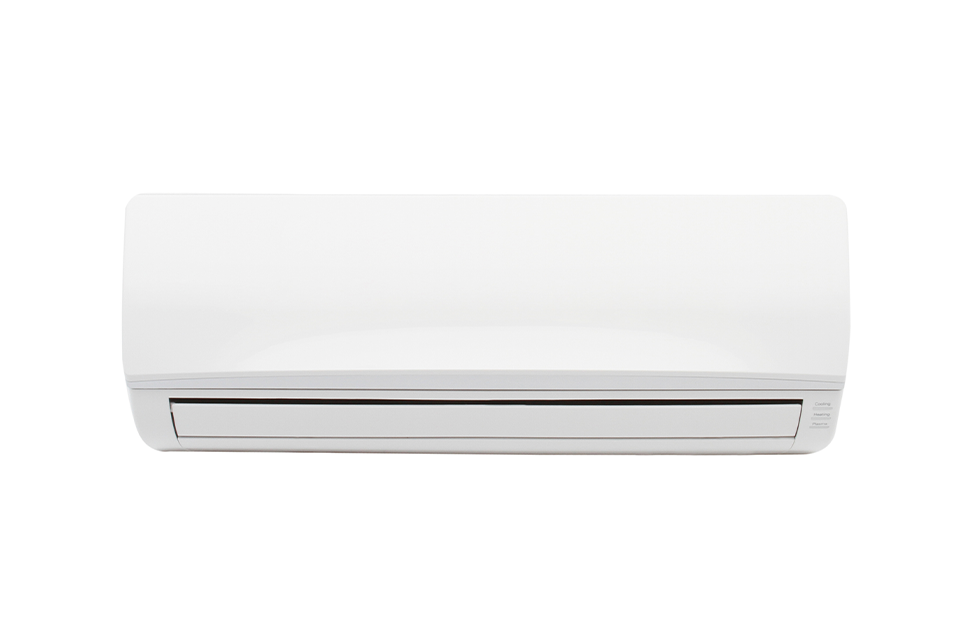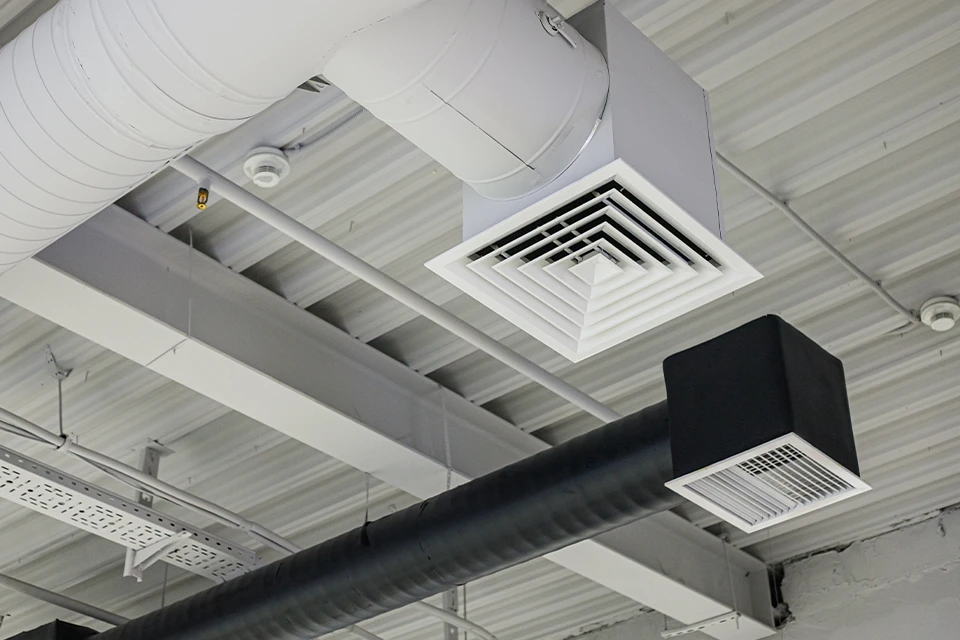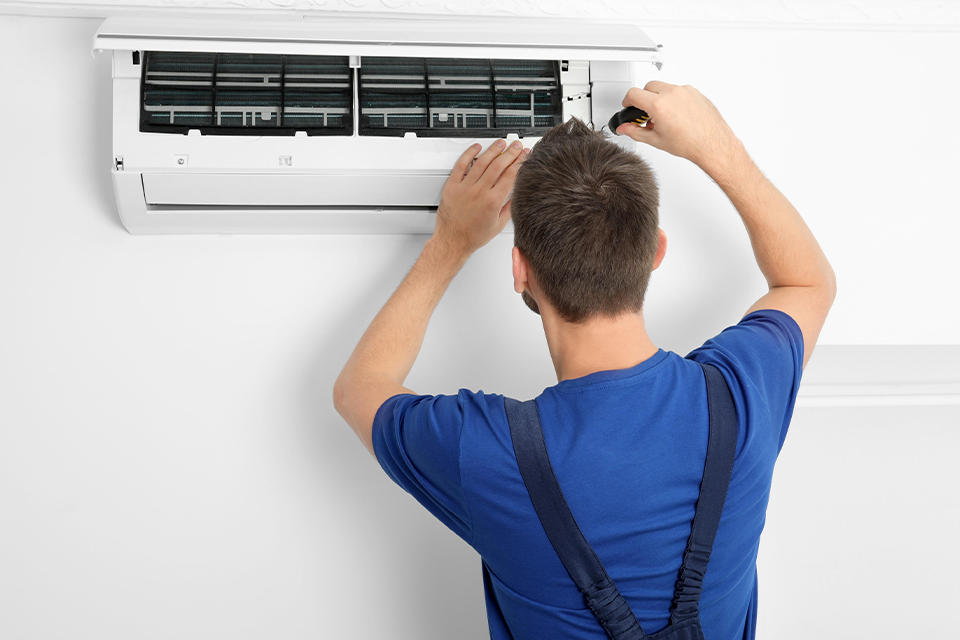
Do Evaporative Coolers work in Melbourne?
August 31, 2023
Air Conditioner Replacement Cost
June 4, 2024Quietest Air Conditioner

When choosing the best air conditioning system for your home, your priority list will likely include finding the most energy efficient & quietest cooling solution for your space.
The quietest air conditioners on the market are both split systems as split systems tend to be quieter than ducted units. These are the Mitsubishi Heavy Industries Avanti and the Mitsubishi Heavy Industries Bronte. The quietest ducted systems are the Mitsubishi Heavy Industries KX Series for smaller units [9kw-14.97kw] and the Daikin Premium Inverter for larger units [18kw-24kw]. So how do you determine what will be the quietest air conditioner for your home? Read on to explore the quietest split system & ducted air conditioners on the market by size, the impact installation has on unit sound output, as well as how to handle noisy existing units.
How is Air Conditioner Sound Measured?
Sound pressure levels and sound power levels are terms used to describe the noise levels air conditioners produce. The sound pressure level is basically what our ears hear. This pressure disturbance in the atmosphere is measured using conditions, environmental factors and the location of equipment. The sound power level is a measure of the acoustic energy emitted from a source of noise, expressed in decibels. Air conditioner sound is measured in decibels (‘dBA’) which is a weighted scale for judging loudness that corresponds to the hearing threshold of the human ear. The louder a sound, the higher the decibel level. Indoor air conditioners usually make 19-50 decibels of sound, while an outdoor unit will make about 46-50 decibels of sound.
So what is a good dBA for an air conditioner? Realistically, any air conditioner with a range between 20 dBA to 50 dBA is considered a good dBA. Read on to explore the sound produced by the two most common types of air conditioning systems, split systems and ducted cooling.

Quietest Split System Air Conditioner
The quietest split system air conditioner in the 1.7kw to 2.65kw category is the Mitsubishi Heavy Industries Avanti, which has a sound level 19/35 dBA indoor sound pressure, an outdoor sound pressure measuring 44 dBA, and 56 dBA for outdoor sound power. At a higher end of the split system noise level sits the Daikin XL series with an indoor sound pressure of 37/51dBA, outdoor sound pressure of 51dBA, and indoor sound pressure of 66dBA.
Below is a list of the 1.7 – 2.65 kW split system air conditioners and their dBA range for indoor sound pressure level, outdoor sound pressure level with SL/H (sound level/high), and outdoor sound power level.
1.7 kW – 2.65 kW rated systems
| Brand | Indoor Unit | Outdoor Unit | Rated Capacity (kW) | Indoor Sound Pressure Level (dBA) (SL/H) | Outdoor Sound Pressure Level (dBA) (SL/H) | Outdoor Sound Power Level (dBA) |
|---|---|---|---|---|---|---|
| Mitsubishi Heavy Industries AVANTI | SRK20ZSA-W/DXK06ZSA-W | SRC20ZSA-W/DXC06ZSA-W | 2.0 | 19 / 35 | 44 | 56 |
| Daikin Alira X | FTXM20WVMA | RXM20WVMA | 2.2 (1.1 – 2.8) | 19 / 39 | 43 / 46 | 58 |
| Mitsubishi Heavy Industries AVANTI PLUS | SRK20ZSXA-W | SRC20ZSXA-W | 2.0 (0.9 – 3.4) | 19 / 38 | 53 | 56 |
| Daikin Cora | FTKM20QVMA | RKM20QVMA | 2.0 (0.9 – 2.8) | 19 / 38 | 43 / 46 | 58 |
| Daikin Zena | FTXJ25TVMAW | RXJ25TVMA | 2.5 (0.9 – 3.7) | 19 / 40 | 43 / 47 | 59 |
| Toshiba Shorai Edge | RAS-10E2KVSG-A | RAS-10E2AVSG-A | 2.50 (0.8 – 3.6) | 21 / 55 | 55/61 | 61 |
| ActronAir Serene Series 2 | WRE-026CS | WRC-026CS | 2.65 (1.0 – 3.5) | 24 / 38 | 52 | 57 |
| Toshiba Seiya Classic | RAS-07E2KVG-A | RAS-07E2AVG-A | 2.0 (0.8 – 2.7) | N/A | N/A | 63 |
| Toshiba Haori | RAS-B10E2KVRG-A | RAS-10E2AVRG-A | 2.50 (0.89 – 3.2) | N/A | N/A | 58 |
The quietest air conditioner in the split system 7.1kw to 8.5kw category is the Mitsubishi Heavy Industries Bronte. It has an indoor sound pressure of 21/43dBA, outdoor sound pressure of 53dBA, and indoor sound pressure of 65dBA, which is still lower than the Daikin.
7.1 kW – 8.5 kW rated systems
| Brand | Indoor Unit | Outdoor Unit | Rated Capacity (kW) | Indoor Sound Pressure Level (dBA) (SL/H) | Outdoor Sound Power Level (dBA) | Outdoor Sound Power Level (dBA) |
|---|---|---|---|---|---|---|
| Mitsubishi Heavy Industries BRONTE | SRK71ZRA-W / DXK24ZRA-W | SRC1ZRA-W / DXC24ZRA-W | 7.1 (2.3 – 8.3) | 24 / 43 | 53 | 65 |
| Fujitsu 7.1kW | ASTG24KMTC | AOTG24KMTC | 7.10 (1.1 – 8.3) | 29/49 | 52/54 | 66 |
| LG 8.5kW Reverse Cycle Split System | WH30SR-18 | WH30SRU-18 | 8.5 (2.0-9.5) | 33/51 | 66 | 66 |
| HZ series Panasonic | CS-HZ71YKR | CU-HZ71YKR | 2.34 | 34 | 49 | N/A |
| Daikin XL Series | FTXV80WVMA | RXV80WVMA | 8.0 (2.0 – 10.5) | 37 / 51 | 51 / 54 | 66 |

Quietest Ducted Air Conditioner
If you are considering a ducted air conditioner, the quietest units available are the Mitsubishi Heavy Industries KX Series [9kw-14.97kw] and the Daikin Premium Inverter [18kw-24kw]. The former has an indoor sound pressure level of only 37dBA and outdoor sound pressure level of 53dBA. Daikin, on the other hand, is outstanding with their premium inverter series three phase model boasting the lowest indoor sound pressure at 44dBA, outdoor sound pressure of 56dBA, and outdoor sound power level sitting at 76dBA.
Below is a list of the range of larger ducted air conditioning options with noise ratings.
9 – 14.97 kW rated systems
| Brand | Indoor Unit | Outdoor Unit | Rated Capacity (kW) | Indoor Sound Pressure Level (dBA) (SL/H) | Outdoor Sound Pressure Level (dBA) (SL/H) | Outdoor Sound Power Level (dBA) |
|---|---|---|---|---|---|---|
| Mitsubishi Heavy Industries KX Series | FDU90KXE6F-W | FDC90KXZEN1-W | 9 (N/A) | 37 | 53 | 65 |
| Daikin Slimline Ducted | FBA100BVM | RZAV100FV1 | 10 (3.5-11.5) | 38 | 51/53 | 70 |
| Panasonic | S-100PE3R | U-100PZH3R5 | 10.0 (3.1 – 12.5) | 48 | 52 | 68 |
| Toshiba | RAV-SM1103DT-A | RAV-SP1104AT-A1 | 10.4 (3.3 – 12.1) | 49 | 49 | 66 |
| Mitsubishi Heavy Industries | FDUA100VH | FDC100VNP-W | 10 (2.1-10.2) | 43 | 59 | 68 |
| Toshiba | RAV-SM1603DT-A | RAV-SP1604AT8-A1 | 13.6 (3.3 – 16.0) | 50 | 51 | 68 |
| ActronAir | EVA150S | CRA150T | 14.68 (N/A) | N/A | 52 | 71.5 |
| ActronAir | EVA130S | CRA130S | 12.24 (N/A) | N/A | 52 | 71.5 |
| ActronAir | EVA150S | CRA150S | 14.97 (N/A) | N/A | 52 | 71.5 |
| ActronAir | EVA130S | CRA130T | 12.4 (N/A) | N/A | 52 | 71.5 |
18 – 22.4 kW rated systems
| Brand | Indoor Unit | Outdoor Unit | Rated Capacity (kW) | Indoor Sound Pressure Level (dBA) (SL/H) | Outdoor Sound Pressure Level (dBA) (SL/H) | Outdoor Sound Power Level (dBA) |
|---|---|---|---|---|---|---|
| Daikin Premium Inverter | FDYQ200LCV1 | RZYQ8TAY1 | 20.0 (10.0 – 22.4) | 44 | 56 | 76 |
| Toshiba | RAV-RM2241DTP-E2 | RAV-GM2241AT8-A | 20.0 [4.6 – 22.4] | 44 | 60 | N/A |
| Panasonic | S-180PE3R5B | U-180PZH2R8 | 18.0 (5.5-20.0) | 48 | 56 | 76 |
| Mitsubishi Heavy Industries | FDU224KXZE1 | FDC224KXZPE1 | 22.4(N/A) | 52 | 60 | N/A |
| ActronAir Advance | EVV210S | CRV210T | 19.0 (N/A) | N/A | 60 | 79.6 |
| ActronAir Advance | EVV210S | CRV210T | 19.0 (N/A) | N/A | 60 | 79.6 |
If you are looking for a smaller air conditioner, a good option is the ActronAir UltraSlim. This air conditioner is in the 2.5 – 7.3 kW rated category, and is very quiet with an indoor sound pressure level of 32.5dBA, outdoor sound pressure level of 60dBA, and outdoor sound power level of 65dBA. In the same category, the Mitsubishi Heavy Industries Akari has an outdoor sound pressure of 47dBA, outdoor sound power level of 60dBA, and indoor sound pressure level of 37dBA.
Below is a list of the range of smaller ducted air conditioning units with noise ratings.
2.5 – 7.3 kW rated systems
| Brand | Indoor Unit | Outdoor Unit | Rated Capacity (kW) | Indoor Sound Pressure Level (dBA) (SL/H) | Outdoor Sound Pressure Level (dBA) (SL/H) | Outdoor Sound Power Level (dBA) |
|---|---|---|---|---|---|---|
| Mitsubishi Heavy Industries Akari | SRR25ZS-W | SRR25ZS-W | 2.5 (0.9~3.4) | 37 | 47 | 60 |
| ActronAir UltraSlim | LRE-071CS | LRE-071CS | .30 (2.80 – 8.40) | 32.5 | 60 | 657 |
| Toshiba | RAV-GM561BTP-A | RAV-GM561ATP-A | 5.0 [1.5 – 5.6] | 34 | 48 | NA |
| Daikin Slim-Line | FBA50BAVMA | RZAV50CV1 | 5.0 (1.4 – 6.0) | 35 | 51 | 68 |
| Daikin Slim-Line | FBA60BAVMA | RZAV60CV1 | 6.0 – (1.4 – 7.1) | 35 | 51 | 68 |
| Daikin Inverter | FDYAN50AV1 | RZA50CV1 | 5.0 (1.4 – 6.0) | 35 | 51 | 68 |
| Mitsubishi Heavy Industries | FDUM 60VH | SRC60ZSXA-W | 5.6 (1.1-6.3) | 36 | 54 | 65 |
| Mitsubishi Heavy Industries | FDUM50VH | SRC50ZSXA-W | 5.0 (1.1-5.6) | 37 | 52 | 60 |
| Daikin Slim-Line | FBA71BVMA | RZAV71CY1 | 7.1 (3.2 – 8.0) | 38 | 50 | 67 |
| Daikin Inverter | FDYAN71AV1 | RZA71CY1 | 7.1 (1.8 – 8.0) | 40.5 | 51 | 68 |
| Daikin Premium Inverter | FDYA71AV1 | RZAS71CV1 | 7.1 (3.2 – 8.0) | 40.5 | 50 | 67 |
| Panasonic | S-71PE3R | U-71PZH3R5 | 7.1 (2.2 – 9.0) | 45 | 48 | 64 |
Acceptable Air Conditioner Noise Levels for Residential Areas
Noise from air conditioners can be a concern in residential areas, possibly disturbing a neighbour’s quality of life. A couple of ways to avoid any issues is to understand the laws when it comes to noise pollution and check the sound power level label on the unit or in the printed specifications. In Victorian residential areas, 68dBA is considered to be a safe noise level. This is because it is the same noise level as conversation creates.
Another tip is to keep neighbours in mind when it comes to the location of the unit. Maybe consult with the neighbour to avoid any unnecessary altercations, and demonstrate that you are making every effort to keep noise to a minimum. With good planning and product knowledge, and communication with the neighbours, you can find the perfect air conditioner to make your home more comfortable, with the confidence that it will satisfy local noise requirements.
Factors that Affect Air Conditioner Noise
If your air conditioner is making a humming, banging or even screeching sound, it could be attributed to a number of factors. Just like any machine, air conditioners deteriorate in their performance and can cause loud noises. Bearings can wear, cabinets rattle, dirt or rust accumulates on the fan blades. However, if your air conditioner is new, other factors may be an issue. While low humming is normal, louder than usual humming can indicate an issue with the fan motor, possibly a blockage from dust or dirt. A buzzing noise could be a potential electrical fault. A squealing noise could possibly indicate that the blower motor’s belt has slipped and may require adjustment.
The type and size of the air conditioning unit you install can affect noise levels as well. The larger the motor on your air conditioner, generally the greater the noise level. As a rule, the more premium quality units tend to operate more quietly. Poor installation of the unit can result in higher sound output and possibly cause the unit to vibrate. If the unit isn’t installed properly, it could also result in loose components, or inadequate insulation. Noises are a normal part of an air conditioner’s operation, but it is important to recognise the difference between expected sounds and those that could indicate a problem. Whether your air conditioner is brand new or you’ve had it for a few years, regular maintenance can all help alleviate any issues and prolong the lifespan of your unit.
Air Conditioner Modes Explained
Most air conditioners have four different modes of fan speed – low, medium, high and automatic. As the component that actually throws out the cool air into the room, it’s worthwhile to understand more about the adjustment of these settings and how they can impact noise levels. The auto fan setting will automatically regulate the fan speed according to the current temperature and the desired temperature. Choosing either low, medium or high fan modes will determine the strength of the air you want blowing into the room, remembering that fan speeds can have an impact on sound levels. When a fan is on high the air conditioner runs louder as the motor works harder to cool the room. If you turn the fan down to a lower level, the air conditioner noise will be reduced to a more acceptable level.
Air Conditioner Placement
The location of the air conditioner can have an impact on its effectiveness and noise levels. When choosing the right spot for your air conditioner, we recommend ensuring that there is plenty of ventilation around the unit, the unit is placed high up, close to the ceiling with adequate clearance on each side. It’s usually best to avoid installing near windows, or anything that may interfere with quality of airflow. Given no two homes are the same, it’s best to have a professional on site assessment, to receive a custom HVAC solution that best suits your home.
Maintaining Your Air Conditioner
Regular maintenance of your air conditioner is essential to ensuring its optimal performance, which may result in noise issues and added expense. Depending on the level of usage, for best results book a service annually, prior to the warmer months of the year. By servicing your air conditioner, you can alleviate any wear and tear problems, improve efficiency, lower electricity bills, and enjoy better indoor air quality.

Noisy Air Conditioner: What Should You Do?
Occasionally an air conditioner will start making loud sounds, but all is not lost. Below is a troubleshooting list of noises you might hear and how to approach them. The type of sound often indicates the type of support you may require:
- Humming Sound.
A louder-than-usual hum could indicate an issue with the fan motor. It is advisable to call a HVAC professional. - Buzzing Noise.
The possible electrical fault should be checked by an electrician. - Rattling Noise.
Among the most common noises, a possible cause of rattling is debris finding its way into the system. Make sure you check your system for any loose parts, check if your air filters need replacing or cleaning. If the noise persists, contact a HVAC professional. - Hissing Noise.
This could mean either an air leak which is minor, or a refrigerant leak in the compressor. To be safe, it is wise to get a professional HVAC assessment for this noise.
Choosing the quietest air conditioning unit for your home is not a difficult decision provided you are armed with the relevant information. Overall the quietest air conditioners on the market are currently the Mitsubishi Heavy Industries Avanti and Bronte split system, and the Mitsubishi Heavy Industries KX Series and the Daikin Premium Inverter ducted system. However, the unit you select will be based on the size of the area requiring cooling, installation options in your home & your budget. Reach out to the friendly team at Simplyair for assistance to choose the quietest air conditioner that will best suit your home.
 Schedule a quote
Request a callback
Schedule a quote
Request a callback

Call us Mon-Fri: 8:30am-5pm or leave us a message for a callback.
